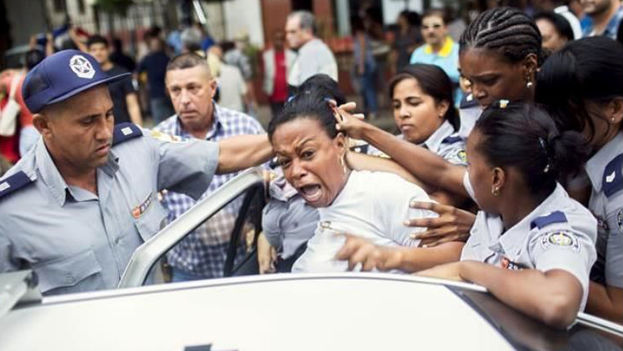
![]() 14ymedio, Zunilda Mata, Havana, 10 December 2016 — For several years on International Human Rights Day, the Cuban government has strengthed its ideological battle on the internet with police operations around the country. The volume of epithets posted on social networks and the official slogans published in on-line forums offer a strong contrast to the poor access to the World Wide Web experienced by people on the island.
14ymedio, Zunilda Mata, Havana, 10 December 2016 — For several years on International Human Rights Day, the Cuban government has strengthed its ideological battle on the internet with police operations around the country. The volume of epithets posted on social networks and the official slogans published in on-line forums offer a strong contrast to the poor access to the World Wide Web experienced by people on the island.
Cuba has one of the lowest internet penetration rates of the Western hemisphere, with fewer than 5% of the population connected, but this Saturday its presence on the web will surpass that of other more connected nations. The authorities have prepared an avalanche of messages of support to spread what they call “the human rights enjoyed by Cuban youth.”
For the virtual offensive they have called on university students, members of the Young Communist Union, and teenagers in high school. The political battle on the network will be accompanied by activities and celebrations in dozens of parks and plazas throughout the country.
“I have to go, but variety is the spice of life; because I publish on Twitter they asked me to take advantage of it and connect with some friends on Facebook,” a student majoring in History at the University of Havana, who is participating in the digital offensive, told this newspaper.
The official press has called the day a “hornet’s nest” that is held under the slogan “My Cuba with rights.” The activities not only address the National Day for Human Rights, but also plan a tribute to “the chief defender of the humble, Comandante en Jefe Fidel Castro Ruz,” according to the announcement.
The activities planned for Saturday also include sports competitions, cultural shows, book sales and presentations of audiovisual materials. The sites chosen for the celebrations coincide in many cases with points where the opposition traditionally demonstrates during the Human Rights Day.
University Law Professor Luis Sola Vila spoke on the Legal segment of the morning news magazine, saying that “in our country the Universal Declaration of Human Rights went into effect with the triumph of the Revolution, undeniably.”
Sola Vila noted that Cuba is a signatory to several treaties, including those against torture, discrimination against women and racial discrimination, but omitted that the government of the island has not yet ratified the United Nations International Covenant on Civil and Political Rights and its International Covenant on Economic, Social and Cultural Rights.
Amid the intense ideological campaign on display in the official media for the occasion, conspicuously absent has been any reference to the rights of association or freedom of expression.
From the early morning hours several activists denounced police operations around their homes and warnings from State Security not to go out into the street. At dawn the headquarters of the Ladies in White in the Havana neighborhood of Lawton was surrounded by political police, according to a report from the dissident Angel Moya.
Officialdom expects to mark another ideological victory on this Human Rights Day, keeping the opposition forces under control, deploying an army of followers on the internet, and staging prepared celebrations in Cuban parks.
